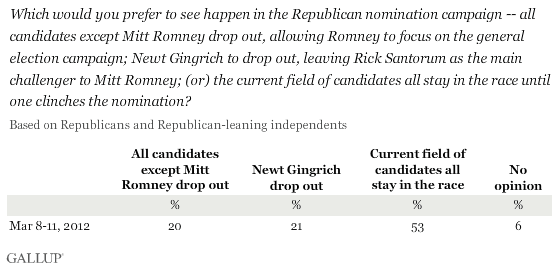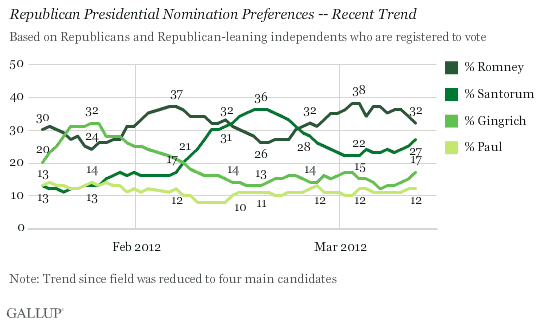PRINCETON, NJ -- More than half of Republicans nationwide (53%) say that all members of the current field of GOP presidential candidates should stay in the race until one clinches the nomination. About one-fifth (21%) say that Newt Gingrich should drop out, leaving Mitt Romney and Rick Santorum to compete for the nomination, while another fifth (20%) say all candidates but Romney should drop out, allowing Romney to focus on the general election campaign.

Some Santorum supporters have argued that Gingrich should drop out, saying that Santorum alone would have a better chance of consolidating the conservative GOP vote that has thus far not heavily supported Romney. Romney's supporters, on the other hand, argue that Romney will almost certainly amass the needed number of delegates to win the nomination as the primary and caucus process plays out, and that concessions by the other candidates now will allow the party to turn its focus to the defeat of Barack Obama in November.
Conservatives More Likely to Support a "Drop Out" Option
Conservatives, who constitute the majority of Republicans nationwide, are slightly more likely than Republicans as a whole to choose one of the two "drop out" alternatives. Still, 49% of conservative Republicans say that all candidates should stay in the field. Additionally, conservatives are basically no more likely to say that Gingrich should drop out than to say that all candidates should drop out, leaving the field to Romney.
Moderate and liberal Republicans are more inclined than average to say that all candidates should stay in the field until one clinches the nomination, but are no more likely than Republicans overall to say that all candidates except Romney should drop out.
Romney's Lead Shrinks
Gallup Daily tracking of the GOP race based on interviewing conducted March 8-12 shows that Romney continues to be Republicans' first choice for their party's nomination, but by a smaller margin than has been the case in recent days. Going into Tuesday night's Southern primaries, Romney now has 32% support nationally, Santorum 27%, Gingrich 17%, and Ron Paul 12%.

Implications
Prior to the results of Tuesday night's primary voting in Mississippi and Alabama, the majority of Republicans seem content to allow the nominating process to play itself out -- with all current candidates remaining in the field. This is in line with Republicans' desire to have the nomination decided among the current field before the GOP convention in late August.
The results of Mississippi and Alabama voting have the potential to significantly alter these sentiments. If Gingrich does not win either of the two Southern states, pressure may mount for him to drop out and concede the conservative, "non-Romney" support to Santorum. If Romney, who has so far not been successful in the South, manages to win one or both of these two states, pressure may mount for both Santorum and Gingrich to acknowledge Romney's presumed inevitable status. If Gingrich wins one or both of the Southern states, the current field will no doubt continue as is for the time being.
Survey Methods
Results for this Gallup poll are based on telephone interviews conducted March 8-11, 2012, with a random sample of 457 Republicans and Republican-leaning independents,aged 18 and older, living in all 50 U.S. states and the District of Columbia.
For results based on the total sample of Republicans and Republican-leaning independents, one can say with 95% confidence that the maximum margin of sampling error is ±6 percentage points.
Interviews are conducted with respondents on landline telephones and cellular phones, with interviews conducted in Spanish for respondents who are primarily Spanish-speaking. Each sample includes a minimum quota of 400 cell phone respondents and 600 landline respondents per 1,000 national adults, with additional minimum quotas among landline respondents by region. Landline telephone numbers are chosen at random among listed telephone numbers. Cell phone numbers are selected using random-digit-dial methods. Landline respondents are chosen at random within each household on the basis of which member had the most recent birthday.
Samples are weighted by gender, age, race, Hispanic ethnicity, education, region, adults in the household, and phone status (cell phone only/landline only/both, cell phone mostly, and having an unlisted landline number). Demographic weighting targets are based on the March 2011 Current Population Survey figures for the aged 18 and older non-institutionalized population living in U.S. telephone households. All reported margins of sampling error include the computed design effects for weighting and sample design.
In addition to sampling error, question wording and practical difficulties in conducting surveys can introduce error or bias into the findings of public opinion polls.
View methodology, full question results, and trend data.
For more details on Gallup's polling methodology, visit https://www.gallup.com/.
